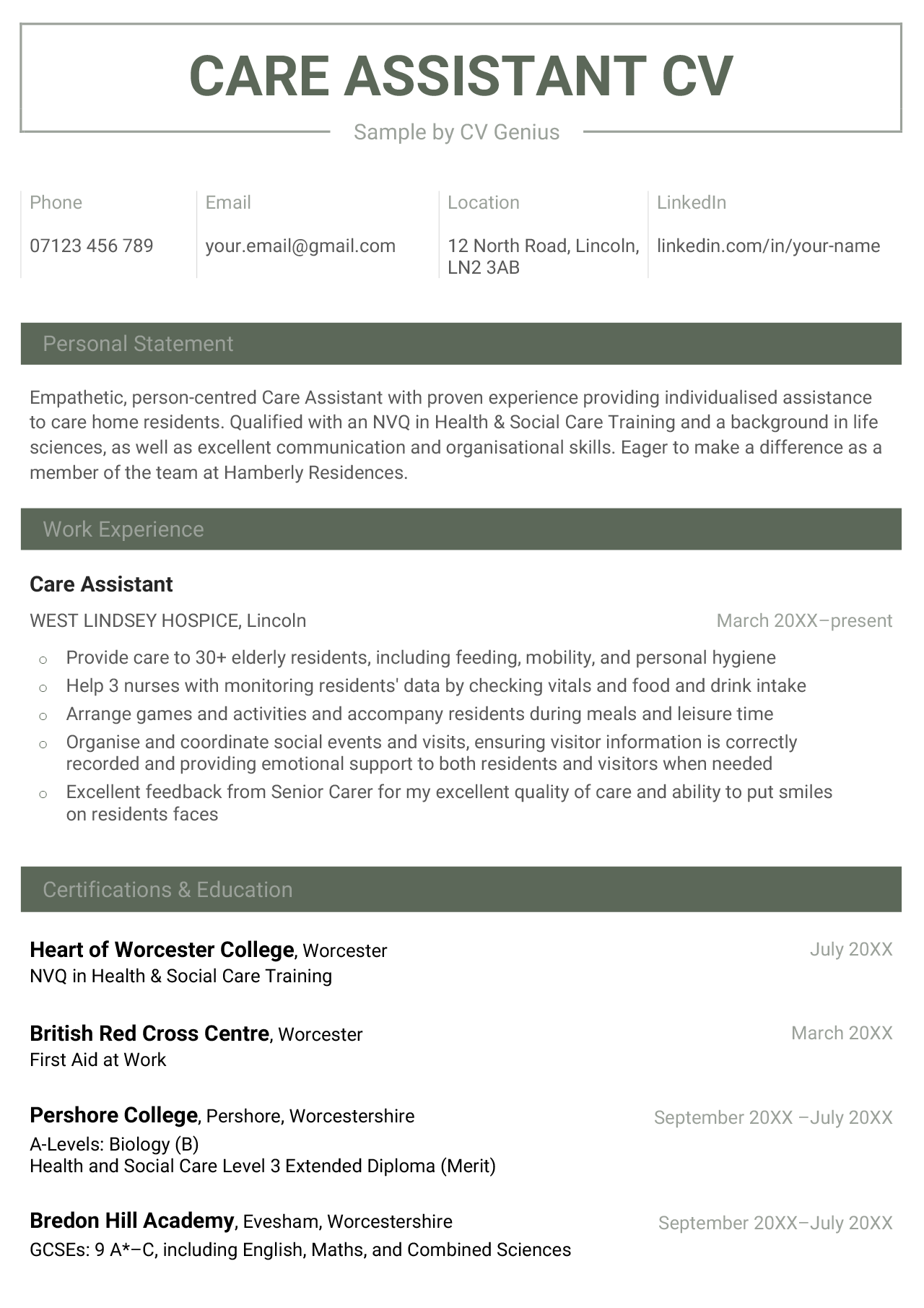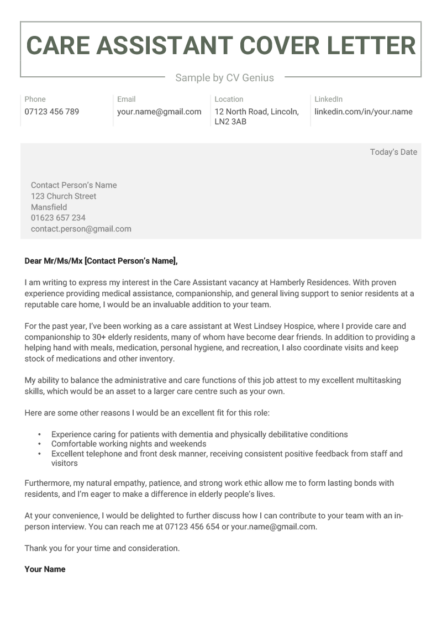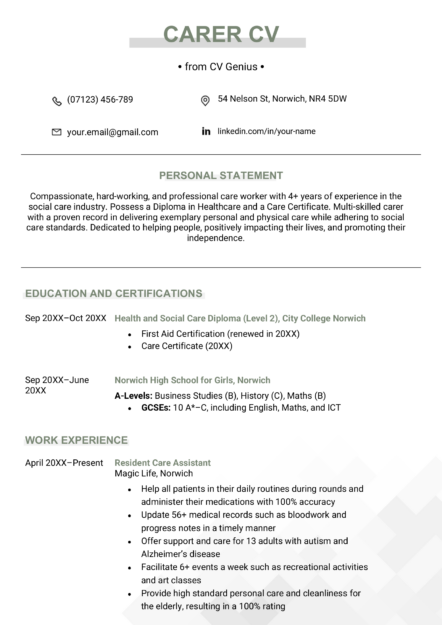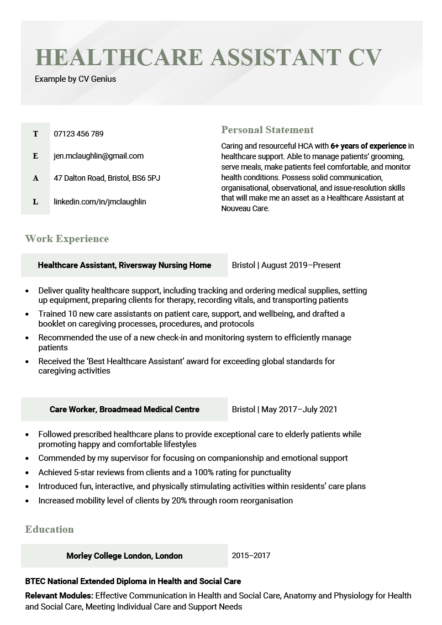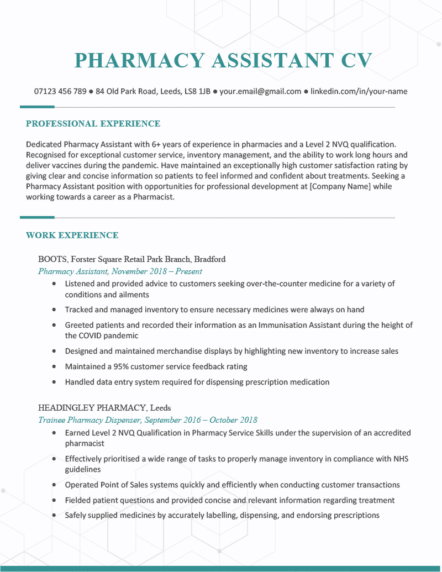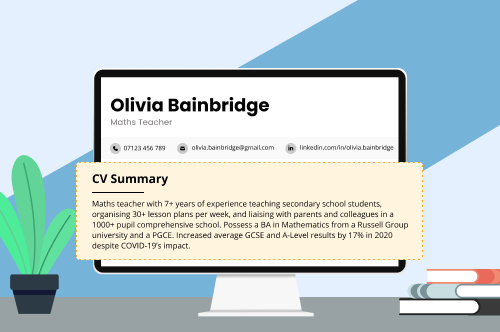Ensure your CV layout is structured to best highlight your unique experience and life situation.
Care Assistant CV Template (Text Format)
PERSONAL STATEMENT
Empathetic, person-centred Care Assistant with proven experience providing individualised assistance to care home residents. Qualified with an NVQ in Health & Social Care Training and a background in life sciences, as well as excellent communication and organisational skills. Eager to make a difference as a member of the team at Hamberly Residences.
WORK EXPERIENCE
Care Assistant, Lincoln
West Lindsey Hospice, March 2022–present
- Provide care to 30+ elderly residents, including feeding, mobility, and personal hygiene
- Help 3 nurses with monitoring residents’ data by checking vitals and food and drink intake
- Arrange games and activities and accompany residents during meals and leisure time
- Organise and coordinate social events and visits, ensuring visitor information is correctly recorded and providing emotional support to both residents and visitors when needed
CERTIFICATIONS & EDUCATION
Heart of Worcester College, Worcester July 2022
NVQ in Health & Social Care Training
British Red Cross Centre, Worcester March 2022
First Aid at Work
Pershore College, Pershore, Worcestershire September 2019 –July 2021
A-Levels: Biology (B)
Health and Social Care Level 3 Extended Diploma (Merit)
Bredon Hill Academy, Evesham, Worcestershire September 2014–July 2019
GCSEs: 9 A*–C, including English, Maths, and Combined Sciences
ADDITIONAL SKILLS
- Patient care
- Feeding and nutrition
- Monitoring patient data
- First Aid
- Safeguarding patients
- Dementia support
- Empathetic listening
- Communication
- Negotiation
- Strategic thinking
- Time management
- Problem-solving skills
HOBBIES & INTERESTS
Reading | Photography | Dancing | Social Media
How to write a care assistant CV
Before you begin writing, make sure you know how to write a CV in a way that best emphasises your strengths.
To be good care assistant, you need to dedicate your life to helping those who can’t help themselves. But to get started, you’ll first have to explain the extent of your abilities in a care assistant CV.
So whether you’re a sole care assistant looking to attract new clients or you’re keen to join an agency as a full-time professional, we’ve prepared these three tips to help you create a CV that gets you that care assistant job you’ve got your eye on.
1. Emphasise your care assistant CV skills
Emphasising your care assistant skills on your CV helps employers see that you know what the job requires and have the knowledge and practical skills to do it well.
Recruiters look for a range of skills on a CV, including hard and soft skills, when deciding who to interview. Technical or hard skills relate to the knowledge you’ve gained through your training as a carer or your on-the-job practical experience. You might take your hard skills for granted, as they’re part of your daily work, but listing them highlights your abilities to your new employer.
Here are some examples of hard skills to include on your CV for a care assistant role:
- First aid trained
- Homecare protocols
- Care techniques for specific conditions (such as dementia and end-of-life care)
- Patient nutrition
- CPR
- Safeguarding patients
- Medication support
- Interpreting doctor’s instructions for patients
- Understanding Care Quality Commission (CQC) and United Kingdom Homecare Association (UKHCA) approval requirements
- Assisting patients and their families to apply for needs assessments
- Training junior care assistants
- Computer skills
Equally important are your soft skills. These interpersonal qualities help you care for your patients personally and professionally. Your soft skills include your ability to make your patients feel comfortable in your presence, so they’re willing to ask for and accept your assistance when they need it.
Some soft skills you can include on your CV for a care assistant are:
- empathy
- active listening
- efficient communication
- interpersonal skills
- time management
- organisational skills
- coordinating activities
- people skills
While your hard skills are visible and measurable, soft skills aren’t quantifiable. So demonstrate your soft skills in the work experience section of your CV to show employers how those skills helped you achieve your accomplishments as a care assistant.
Here are some examples from the work experience section of an experienced care assistant:

2. Use strategic action verbs to describe your care assistant CV’s duties
As a care assistant, you may be tempted to list your duties and jobs in the work experience section of your CV by starting with cliched phrases like ‘tasked with’ or ‘responsible for’. To make your care assistant CV stand out, swap those overused phrases for powerful CV action verbs.
Action verbs add energy to your CV, and demonstrate what you achieved with the responsibilities you had.
For example, if you were ‘tasked with’ ensuring your client’s treatment proceeded according to the doctor’s orders, you could use these action verbs:
- Administer
- Oversee
- Supervise
- Coordinate
- Facilitate
- Guide
And instead of saying that you were ‘responsible for’ communicating with the client and their family, use these action verbs:
- Liaise
- Discuss
- Update
- Relay
- Explain
- Instruct
Start each of your work experience bullet points with a different action verb to maintain the energy throughout your CV for a care assistant role.
3. Tailor your care assistant CV to the job post
No two patients are the same, and the care they need is as unique as they are. When you’re applying for a role, take the time to understand exactly what the employer is looking for in a care assistant.
For instance, is the employer looking to expand a small team and keen for a candidate who can take on various tasks? Or is this job for one-on-one care, and your fit for a specific patient will determine whether you get the position?
Whichever type of job you’re applying for, be sure your CV illustrates how your skills, qualifications, and experience make you perfect for the role. Use the work experience section on your CV to highlight aspects of your previous jobs that match the recruiter’s needs.
For example, a care assistant applying for an agency role might include these types of bulleted statements in their CV’s work experience section:
- Coordinated team of 12 carers to deliver quality care to 20 residents in the sheltered housing unit, including 7 requiring physical assistance and 5 with dementia
- Overhauled administrative systems, resulting in a 50% reduction in recording errors and a 10% improvement in case reporting times
However, when applying for a home care role for a patient with dementia, the same care assistant might present their experience like this:
- Reduced perceived stress levels of clients with dementia, while improving cooperation with day-to-day activities, through an empathetic and patient approach
- Guided clients through the home assessment process, and helped them successfully acquire funding for the recommended home adaptations
You’ll also need a cover letter in your application, so learn how to write one or use a cover letter builder to create one in minutes.
